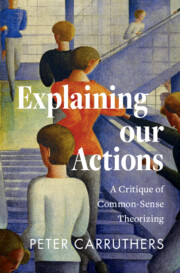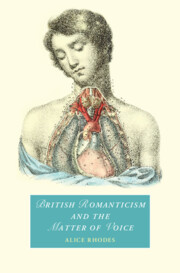Refine search
Actions for selected content:
149 results
Chapter 14 - Political Theory
- from Part III - Political Science
-
- Book:
- The Ladder of the Sciences in Late Antique Platonism
- Published online:
- 08 December 2025
- Print publication:
- 08 January 2026, pp 195-209
-
- Chapter
- Export citation
Chapter 6 - Ethics in Plotinus and His Successors
- from Part II - Ethics
-
- Book:
- The Ladder of the Sciences in Late Antique Platonism
- Published online:
- 08 December 2025
- Print publication:
- 08 January 2026, pp 77-97
-
- Chapter
- Export citation
12 - Sin and Evil
- from Part II - Theological Themes
-
-
- Book:
- The Origins of Scholasticism
- Published online:
- 18 November 2025
- Print publication:
- 08 January 2026, pp 333-360
-
- Chapter
- Export citation
Opalite Happiness
- Part of
-
- Journal:
- Public Humanities / Volume 1 / 2025
- Published online by Cambridge University Press:
- 12 December 2025, e173
-
- Article
-
- You have access
- Open access
- HTML
- Export citation
Chapter 9 - Suárez on the Influx or Causality of the Final Cause
- from Part III - Causation
-
-
- Book:
- Suárez's <i>Metaphysical Disputations</i>
- Published online:
- 13 October 2025
- Print publication:
- 30 October 2025, pp 162-180
-
- Chapter
- Export citation
8 - Leadership and critical reflective practice
- from Part 2 - Leads Self
-
-
- Book:
- Leading and Managing Health Services
- Published online:
- 15 August 2025
- Print publication:
- 28 August 2025, pp 87-98
-
- Chapter
- Export citation
Chapter 1.2 - Cardiovascular Physiology
- from Sec 1 - Physiology
-
- Book:
- Dr Podcast Scripts for the Primary FRCA
- Published online:
- 19 June 2025
- Print publication:
- 03 July 2025, pp 33-54
-
- Chapter
- Export citation

Explaining our Actions
- A Critique of Common-Sense Theorizing
-
- Published online:
- 17 April 2025
- Print publication:
- 08 May 2025
10 - The Evolutionary Challenge and Where Each of Us Fits In
-
- Book:
- A Climate of Truth
- Published online:
- 27 March 2025
- Print publication:
- 27 March 2025, pp 212-233
-
- Chapter
- Export citation
Chapter 19 - Neuronal Overlap during Observation and Action
- from Part IV - Neurobiological Theories
-
- Book:
- Looking Ahead
- Published online:
- 20 March 2025
- Print publication:
- 06 March 2025, pp 208-219
-
- Chapter
- Export citation
Chapter 10 - Continuous Cycles of Perceiving, Acting, and Adjusting
- from Part II - Psychological Theories
-
- Book:
- Looking Ahead
- Published online:
- 20 March 2025
- Print publication:
- 06 March 2025, pp 98-111
-
- Chapter
- Export citation
7 - Moral Decision Making
- from Part II - Thinking and Feeling
-
-
- Book:
- The Cambridge Handbook of Moral Psychology
- Published online:
- 20 February 2025
- Print publication:
- 27 February 2025, pp 153-171
-
- Chapter
- Export citation
2 - Philosophy of AI
- from Part I - AI, Ethics and Philosophy
-
-
- Book:
- The Cambridge Handbook of the Law, Ethics and Policy of Artificial Intelligence
- Published online:
- 06 February 2025
- Print publication:
- 13 February 2025, pp 40-58
-
- Chapter
-
- You have access
- Open access
- HTML
- Export citation
Chapter 2 - John Thelwall and the Physiology of Speech
-
- Book:
- British Romanticism and the Matter of Voice
- Published online:
- 16 January 2025
- Print publication:
- 23 January 2025, pp 63-107
-
- Chapter
- Export citation

British Romanticism and the Matter of Voice
-
- Published online:
- 16 January 2025
- Print publication:
- 23 January 2025
Chapter 4 - Freedom and Social Practices
- from Part II - Reconstructing the Concept of Freedom
-
- Book:
- Reconceiving Freedom from the Shadows of Slavery
- Published online:
- 02 January 2025
- Print publication:
- 09 January 2025, pp 84-110
-
- Chapter
- Export citation
18 - Single-Case Analysis
- from Part V - Avenues into Action
-
-
- Book:
- The Cambridge Handbook of Methods in Conversation Analysis
- Published online:
- 06 December 2024
- Print publication:
- 05 December 2024, pp 487-511
-
- Chapter
- Export citation
10 - N = 1 Four-dimensional off-shell supergravity
- from Part I - Formalism
-
- Book:
- Introduction to Supergravity and its Applications
- Published online:
- 14 November 2024
- Print publication:
- 21 November 2024, pp 114-120
-
- Chapter
- Export citation
Chapter 16 - Parenting and Grandparenting Our Youth in the Climate Crisis
- from Part II - Multidisciplinary Perspectives on Youth Climate Distress
-
-
- Book:
- Climate Change and Youth Mental Health
- Published online:
- 06 June 2024
- Print publication:
- 13 June 2024, pp 309-328
-
- Chapter
- Export citation
The Primacy of the Practical
-
- Journal:
- Canadian Journal of Philosophy / Volume 53 / Issue 4 / May 2023
- Published online by Cambridge University Press:
- 13 May 2024, pp. 301-314
-
- Article
-
- You have access
- Open access
- HTML
- Export citation
